

Mental Models: The Best Way to Make Intelligent Decisions (113 Models Explained) How do you think the most rational people in the world operate their minds?
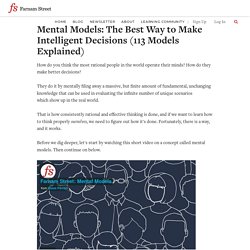
How do they make better decisions? They do it by mentally filing away a massive, but finite amount of fundamental, unchanging knowledge that can be used in evaluating the infinite number of unique scenarios which show up in the real world. That is how consistently rational and effective thinking is done, and if we want to learn how to think properly ourselves, we need to figure out how it's done. Fortunately, there is a way, and it works. Before we dig deeper, let's start by watching this short video on a concept called mental models. The Most Underrated Skill in Management. References (20) 1.

R. Gibbons and R. Henderson, “What Do Managers Do? Exploring Persistent Performance Differences Among Seemingly Similar Enterprises” in “The Handbook of Organizational Economics,” ed. 2. "Calling Bullshit" Is the College Course for Our Times - Here's How You Can Take It Online. Taking a course with the word "bullshit" in its title is a cynical student's dream that University of Washington professors Carl Bergstrom and Jevin West are making a reality.

Their 10-week seminar, enticingly titled "Calling Bullshit in the Age of Big Data" begins in March. The course is a perfect match for our fact-challenged times, where charges of "fake news" and "alternative facts" have become part of common public discourse. If you can't take the course in person, you can follow it online, as its syllabus, readings and recordings of lectures will be available to the general public. The synopsis of the course is listed succinctly as "Our world is saturated with bullshit. Learn to detect and defuse it. " The course looks to teach students key skills for judging information. It's hard not to agree with such objectives. The Genius Problem-Solving Method Elon Musk Learned From Aristotle. Big Think - Leonardo da Vinci, everyone's favorite... Be More Persuasive by Answering These 3 Questions.
Reader Resource Apply now to be an Entrepreneur 360™ company.
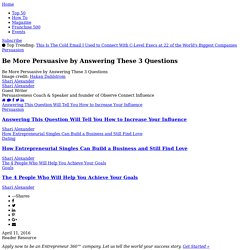
Let us tell the world your success story. Get Started » How to talk to people you disagree with. Rules for the Direction of the Mind: Descartes’s 12 Timeless Tenets of Critical Thinking. By Maria Popova In the late 1620s, about a decade before he coined Cogito ergo sum (“I think, therefore I am”) — the slogan that would establish him as the founding father of modern Western philosophy — the great French philosopher, scientist, and mathematician René Descartes (March 31, 1596–February 11, 1650) set about delineating the rules of critical thinking.
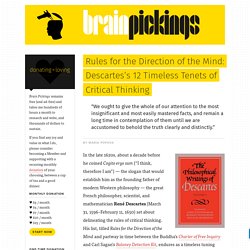
How to Criticize with Kindness: Philosopher Daniel Dennett on the Four Steps to Arguing Intelligently. By Maria Popova.
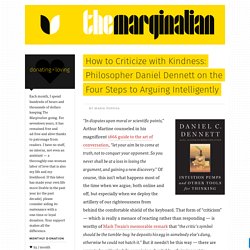
How to Change Minds: Blaise Pascal on the Art of Persuasion. If it weren’t for the “backfire effect” — the strange psychological phenomenon behind our propensity for self-righteousness — changing people’s minds wouldn’t be such an uncomfortable luxury.
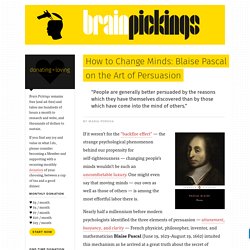
One might even say that moving minds — our own as well as those of others — is among the most effortful labor there is. Nearly half a millennium before modern psychologists identified the three elements of persuasion — attunement, buoyancy, and clarity — French physicist, philosopher, inventor, and mathematician Blaise Pascal (June 19, 1623–August 19, 1662) intuited this mechanism as he arrived at a great truth about the secret of persuasion: Pascal came to see that the surest way of defeating the erroneous views of others is not by bombarding the bastion of their self-righteousness but by slipping in through the backdoor of their beliefs. Strange Beauty: How Reading the Classics Will Change You - Video.
The Baloney Detection Kit: Carl Sagan’s Rules for Bullshit-Busting and Critical Thinking. Carl Sagan (November 9, 1934–December 20, 1996) was many things — a cosmic sage, voracious reader, hopeless romantic, and brilliant philosopher.

But above all, he endures as our era’s greatest patron saint of reason and critical thinking, a master of the vital balance between skepticism and openness. In The Demon-Haunted World: Science as a Candle in the Dark (public library) — the same indispensable volume that gave us Sagan’s timeless meditation on science and spirituality, published mere months before his death in 1996 — Sagan shares his secret to upholding the rites of reason, even in the face of society’s most shameless untruths and outrageous propaganda. Through their training, scientists are equipped with what Sagan calls a “baloney detection kit” — a set of cognitive tools and techniques that fortify the mind against penetration by falsehoods: The kit is brought out as a matter of course whenever new ideas are offered for consideration.
Debate Theory. Creativity. MUN Resources. A Simple Mind Trick Will Help You Think More Rationally - Video. Dan Ariely: There’s one way to be rational; there are many ways to be irrational.

We could be irrational by getting confused, not taking actions, being myopic, vindictive, emotional. Dr Shashi Tharoor MP - Britain Does Owe Reparations.